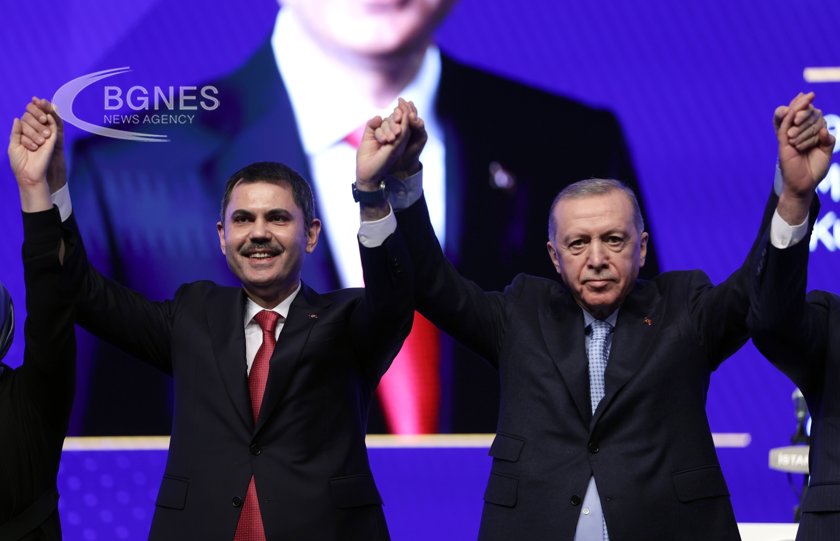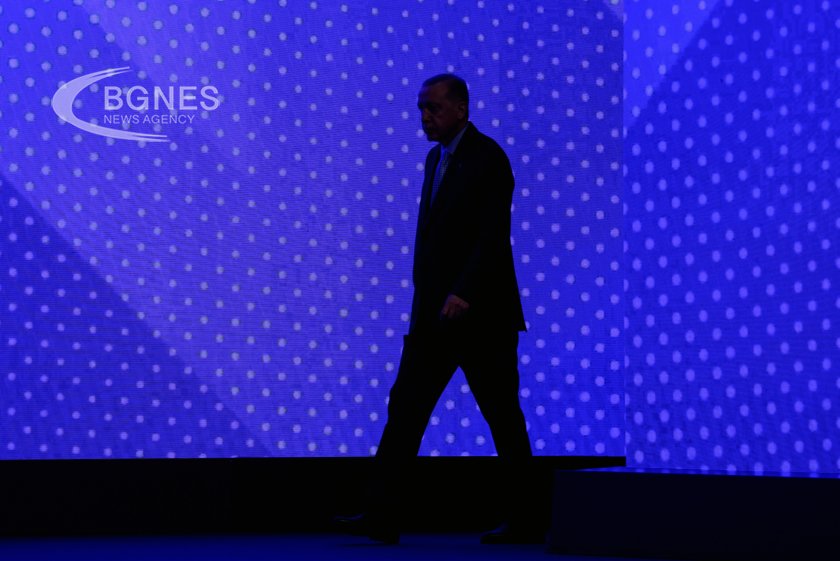If Turkish President Recep Tayyip Erdogan's party wins back Istanbul from the opposition in the local elections (March 31), he may feel comfortable enough to focus on more positive steps to build a legacy, but a loss could cause him to turn to nativist and populist policies at home and abroad.
On March 31, some 58 million registered Turkish voters will go to the polls in nationwide local elections to choose mayors of nearly 4,000 cities and smaller towns, as well as tens of thousands of city and provincial council members and other local officials. The results will have no direct impact on President Recep Tayyip Erdogan's government. However, as voters cast ballots across the country, local elections serve as a bellwether for Turkey's national politics, the equivalent of the U.S. midterm elections.
In that sense, the election will help Erdogan decide whether he can simply start ignoring his challengers at this point. In the May 2023 parliamentary and presidential elections, he defeated his opposition, an alliance of six parties spanning the political spectrum, including the main opposition Republican People's Party (CHP). This victory has firmly established him at the helm of Turkey, and if he can defeat the opposition once more on 31 March, he may conclude that there are no longer any legitimate challengers. This will allow him to enter the legacy-building phase of his career - i.e., addressing the country's problems (e.g., through a "Kurdish opening" or dialogue with the country's Kurdish community) while also embracing a more international role in foreign policy (e.g., building on Ankara's recent reset with neighbors such as Greece, pursuing a potential reset with the United States on Syria).
However, if the presidential candidates fail to win back Istanbul and other key cities from the opposition, Erdogan is likely to emerge from the election with a sense of political vulnerability.
Moreover, if Istanbul Mayor Ekrem Imamoglu, who defeated Erdogan's candidate in the 2019 local elections, beats the president's current candidate, Murat Kurum, it will catapult him to political prominence as the "political star who can beat Erdogan." Such a development would also make Imamoglu a credible challenger to Erdogan himself, giving a boost to the anti-Erdogan bloc in the country. In such a situation, Erdogan may seek to strengthen his base and prevent the opposition from growing by doubling down on nativist/populist policies at home and internationally.
Each of Turkey's three largest cities - Istanbul, Ankara, and Izmir - is currently controlled by the opposition. However, Istanbul is the largest of these and remains the country's economic, financial, and cultural capital, so it stands out as the big prize in the race. If Kurum manages to wrest this prize back from Imamoglu, the electorate will conclude that Erdogan has won the election, even if his candidates fail in the race in the other major cities. Or, if Imamoglu retains Istanbul, he will be considered to have defeated Erdogan himself, making him perceived as a worthy rival to the president. Polls currently show a tight race for the city, with Imamoglu leading by a narrow margin over Kurum.
Apart from Istanbul's symbolic importance for the March 31 elections, Erdogan has an interest in capturing it for personal and financial reasons. Born and raised there, he entered national politics in 1994 as the city's mayor before becoming Turkey's prime minister in 2003 and president in 2014. He considers Istanbul "his city," a key part of the Erdogan "brand," and so wants to wrest it out of Imamoglu's hands.

Istanbul also holds a lot of economic weight for the president. The city is a money-making machine, accounting for almost half of Turkey's tax base and about a third of its economic output. Local construction, real estate and urban renewal projects (e.g. demolishing earthquake-prone buildings to build earthquake-resistant ones) generate large amounts of cash, and Erdogan wants to make it available to his supporters and the businesses that back him. Victory in Istanbul means everything to him.
If Imamoglu wins despite Erdogan's various advantages (e.g., near-total control of the media), the president's flank will be exposed, and the re-elected mayor could experience a meteoric rise. In this scenario, the counter to Erdogan would be political polarization. To this end, he may launch a debate on a new constitution that includes an amendment on "family values", defining marriage exclusively as a union between a man and a woman, to rally right-wing voters. The new constitution could also lower the threshold for winning the next presidential election to 40%, which is easier for Erdogan to achieve than a majority. As part of his strategy to win such a referendum, he could also take a hard turn on foreign policy, seizing on issues such as anti-Western sentiment, the Gaza war, and ties with the United States to rally right-wing voters. This approach is likely to resemble Turkish politics circa 2013-19, when Erdogan emphasized nativist/populist policies at home and abroad.

If Imamoglu loses, however, the president is likely to adjust his political calculations and steer Turkey in a different direction. To begin with, a Kurum victory would effectively halt Imamoglu's political career, possibly ensuring that he no longer poses a threat to the president. In addition, the main opposition Republican People's Party (CHP) will lose a major source of revenue and clientelist networks in Istanbul, and many elements of the broader opposition movement in the country will simply give up on the idea of voting to remove Erdogan. Accordingly, the president will emerge from the election believing (rightly) that he has almost no viable opposition to worry about - a notable exception being the small but staunchly Islamist New Prosperity Party (NPP), which could challenge his Justice and Development Party (AKP) on the right.
Victory in Istanbul would allow Erdogan, who has ruled Turkey since 2003, to enter the legacy-building phase of his career. He wants to be remembered as a beloved statesman, not as a polarizing politician; acting accordingly after the Istanbul victory would allow the president to move beyond the culture wars he often engages in to mobilize his base. He could even embrace various groups he has often demonized in the past, such as secular and leftist voters. Moreover, this scenario could allow him to introduce a package of constitutional amendments that would give him additional mandates. Yet unlike the "losing leads to political polarization" scenario described earlier, a victorious Erdogan could instead build a broader electoral consensus to change the constitution, including reaching out to the Kurdish community.
Indeed, this is where Turkey's elusive Kurdish problem comes in, with Erdogan likely to take steps to address the country's biggest political challenge at the moment. Ankara has recently implemented a successful counter-terrorism strategy to defeat the Kurdistan Workers' Party (PKK), a US-designated terrorist entity. The group used to have thousands of armed fighters in Turkey, but thanks to the government's successful counter-terrorism strategy, its local force has dwindled to a few hundred. However, the political solution to the Kurdish problem is still to come. At this stage, the demands of the pro-Kurdish groups are limited to some rights to use the Kurdish language (for example in education) and recognition of the mayors elected by the pro-Kurdish People's Equality and Democracy Party (also known as the DEM Party).
Interestingly, perhaps expecting an olive branch from the president, the DEM party will not support Imamoglu in the 31 March elections - unlike in previous elections when pro-Kurdish parties supported a pro-RNP politician - and has instead decided to field its own candidate. This development could cost Imamoglu the victory in the mayoral race, as it would peel off a significant number of Kurdish voters (estimated at around 10% of the city's electorate) and ensure Kurum's victory.
A rapprochement between Erdogan and the Kurdish communities that support the DEM party would have repercussions beyond the country's borders, especially in light of the seemingly growing potential for a US withdrawal from Syria. Since 2014, the United States has partnered with the Syrian Kurdish People's Protection Units (YPG) forces in the fight against the Islamic State (ISIS). Although the YPG merged into the Syrian Democratic Forces in 2015, this partnership continues to draw Ankara's ire. Washington's relationship with the YPG will likely become less visible, if not cease to exist altogether, in the event of a U.S. withdrawal from Syria. Whichever way U.S. policy in Syria evolves, the YPG problem will become less damaging to U.S.-Turkish ties if the PKK unconditionally agrees to disband, disarm, and subsequently withdraw from Turkey in response to Erdogan's Kurdish opening.
Polls show a competitive race for Istanbul on March 31. Although the race is technically only for mayor, the results will have significant implications for the entire country, as Erdogan's legacy and the future of U.S.-Turkey relations may hang in the balance. / BGNES
-----------------------------------------------------------
Soner Kagaptay, Washington Institute







